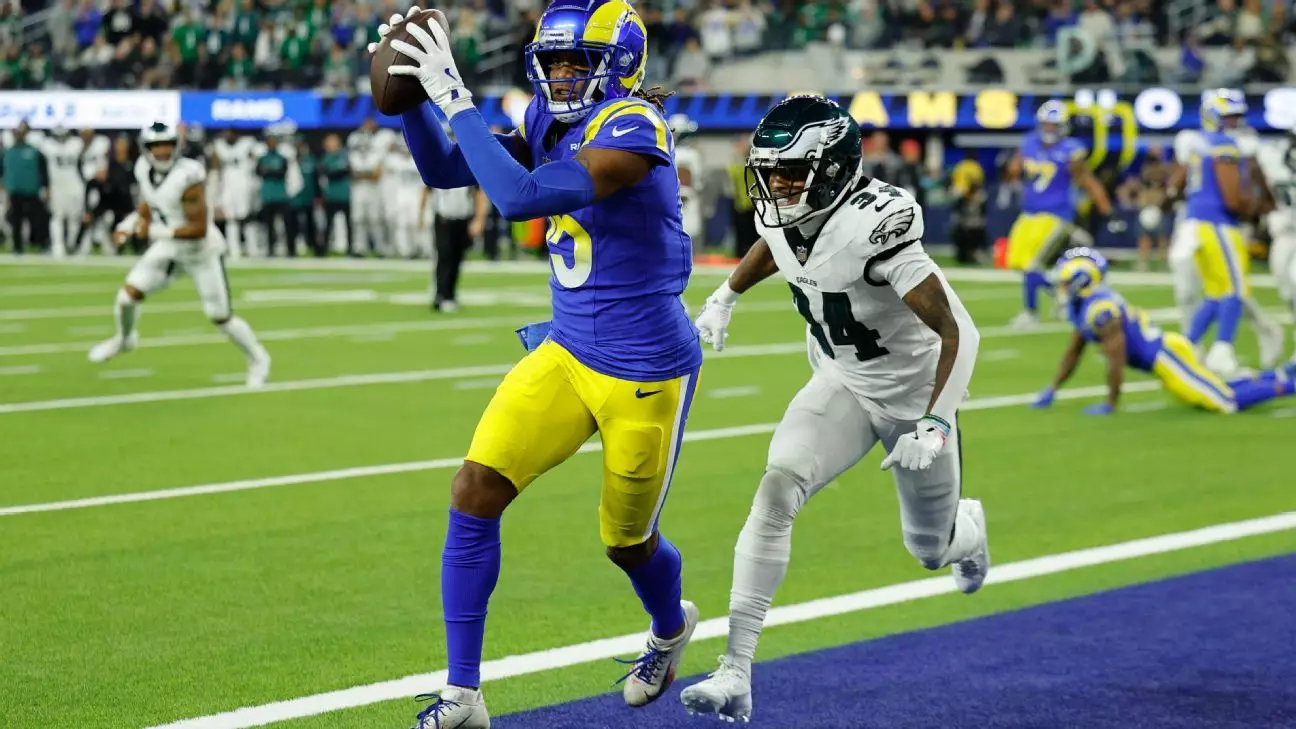The sports world often finds itself grappling with the actions of its players, particularly as they relate to conduct off the field. A recent incident involving Los Angeles Rams wide receiver Demarcus Robinson has reignited discussions surrounding player accountability and the repercussions of irresponsible behavior. The aftermath of Robinson’s DUI arrest not only affects him personally but also sends ripples throughout the team and the NFL at large.
Demarcus Robinson’s arrest on Monday morning, following a dramatic episode of reckless driving that exceeded speeds of 100 mph, raised immediate concerns about player behavior in professional sports. The Los Angeles Rams head coach, Sean McVay, confirmed that the team would refrain from imposing internal disciplinary measures, opting instead to allow the legal process to unfold. This decision underscores a critical balance that franchises must strike: supporting their athletes while maintaining accountability.
Robinson’s arrest occurred shortly after he had a notable performance against the Philadelphia Eagles, demonstrating the stark contrast that can exist between an athlete’s on-field achievements and off-field choices. Coach McVay’s statement reflected understanding yet concern, emphasizing the importance of learning from serious mistakes. “I think it was a bad decision he made. I don’t think that makes him a bad person,” McVay stated, acknowledging that players are human and capable of error. Such a viewpoint reassures fans that the franchise cares about its players beyond their performance, though it also brings forth the question of how such decisions reflect on the team.
The incident’s impact extends beyond Robinson himself; it also affects the team’s culture. McVay highlighted that Robinson addressed the team to express his remorse, a crucial step in maintaining team unity and accountability. Such moments provide opportunities for growth, allowing players to reflect on their actions and learn the importance of setting a positive example. “I do trust that he’s going to learn from it, and I think it’ll be a good learning opportunity for our whole football team,” McVay observed, indicating that the learning process is more crucial than punishment in this context.
Robinson’s acknowledgment of his mistake demonstrates a necessary level of introspection, particularly when he stated, “It’s a bad look.” This sentiment not only reflects his personal regret but also highlights the responsibilities athletes carry as public figures. The expectation that players will conduct themselves with dignity and respect extends beyond the boundaries of the stadium; it permeates their status in the community and their influence on younger fans.
As the legal situation unfolds, Robinson must also navigate the potential impact on his NFL career. While the league possesses a disciplinary process, how the incident is perceived by fans and stakeholders could affect his standing within the organization. Robinson expressed hope that his misstep could serve as a lesson for his teammates, promoting accountability without necessitating similar experiences. “I’ve already gone through a lot of stuff to try to overcome it,” he remarked, indicating a desire for personal growth and positive change.
This incident highlights a vital aspect of professional sports: the intersection of personal actions and public responsibilities. Athletes are not just performers; they are role models whose decisions can influence a vast audience. Robinson’s experience serves as a reminder of the importance of making sound choices, both personally and professionally, and of the broader consequences those choices can spawn.
As the Los Angeles Rams prepare to move forward with their season, the team faces the dual challenge of supporting Robinson while ensuring they remain focused on their objectives. This situation serves as a reminder that respect, responsibility, and self-awareness are integral to success—not just on the field but off it as well. It will be critical for Robinson to translate this moment into meaningful lessons, not just for himself but for his team, as they each strive to embody the values that define their organization and its community. Ultimately, the incident emphasizes that while talents may shine brightly, it is the choices behind the scenes that often forge the truest legacy in the world of sports.

